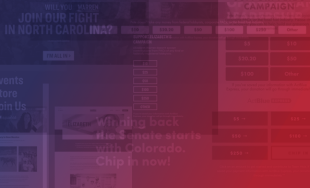Three Important Strategies in Online Political Advertising
When we work with a candidate or ballot issue, it’s about more than just a website, it’s about an overall online political campaign. An increasing focus of those online campaigns is placing online ads for the campaign. When placing ads, our top goals are to provide relevant context and strong calls-to-action to voters.
There are a number of strategies and tactics in place when placing ads to achieve these goals. Looking around the web, I’m always amazed at how some campaigns (or their “online gurus”) totally miss the boat on good online advertising strategy. Here are three helpful strategies to use when placing online political ads.
Geo-Target
It is always shocking to me when I am presented with an ad from another state, especially for a smaller campaign. Below is an ad that recently appeared in my gmail.

This ad is for a campaign for Georgia State Representative. Why are they bothering to advertise in North Carolina? While it is true that my company does work with some Georgia campaigns, it is a complete waste for this campaign to target people outside their district, let alone a state away. The only possible explanation would be if they were placing ads against her opponent’s name or about district-specific issues, and I guarantee you that neither of those appear in my email.
This rule doesn’t always apply to larger, high profile campaigns who have targeted niches across state lines. For example, it would’ve made since for the Sestak for Senate campaign to target Naval Academy grads across the country.
This rule falls into our “context” bucket – geography is one of the best sources of context for voters. Start by targeting your district and then work backwards through demographics, issues, etc. to make your ads even more targeted.
Place Ads on Election Day
I’ve been noticing lately that most campaigns are not placing ads on election day. This omission is a really large lost opportunity.
While I understand that almost no voter will be swayed on the actual day of the election, these ads carry more of a purpose than just persuasion. A campaign’s election day ads should focus on GOTV efforts, whether it’s helping voters find their polling place, reminding them to vote, or pushing them to volunteer for election day.
With GOTV as the primary motivation, there are several types of phrases you should advertise around on election day. The first of which is the candidate’s name. If someone is searching for your candidate on election day, you would hate for them to be a mild supporter who doesn’t realize that it’s the day to vote for the candidate – this rule is especially true for primary or special election online campaigns where turnout is low and people frequently forget the date of voting. Other terms should be general election queries, e.g., election day, where to vote, etc.
This tenet falls into both the "context" and "strong call to action" buckets, as it helps provides context and purpose to your calls to action.
Understanding CPM vs. CPC.
When employing these online advertising strategies, it’s always important to draw the difference between Cost Per Thousand Impressions (CPM) ads and Cost Per Click (CPC) ads.
The majority of campaign advertising should likely be done through CPC. This is because your ads should be driving people to action and you only want to be charged for them succeeding. Furthermore, a budget can quickly disappear on people who aren’t at all interested in your campaign when you just pay per impression. CPC makes sure you’re only being charged for people you successfully motivate (or offend) enough to click on your ad.
That’s not to say there’s no place for CPM. CPM should be used when you’re just trying to raise mass awareness of an issue or create a brand for the campaign. For example, in a short ballot levy or special election campaign, you may only have a month or two to stir up as many supporters as possible. In those cases, CPM can be a great option to get mass exposure and create a brand for the campaign, letting action take a backseat.
Conclusion
The above strategies are important tenets in any online campaign. Do you have any other basic strategies that can’t be ignored and should be included on this list? If you do your own ads, the above rules should help you put together a good campaign. In any case, it’s always helpful to have professionals on staff who have experience in purchasing online ads, as a budget can quickly disappear.



Leave the first comment